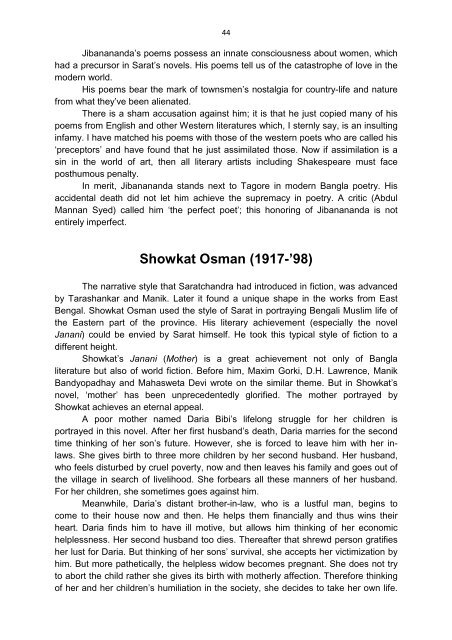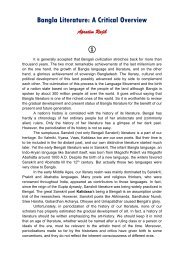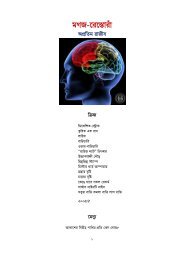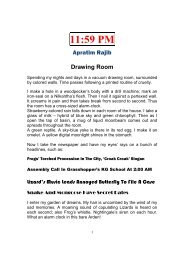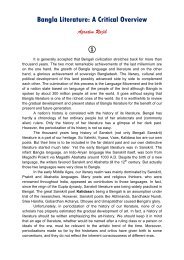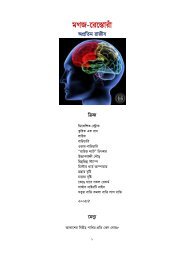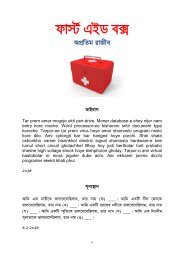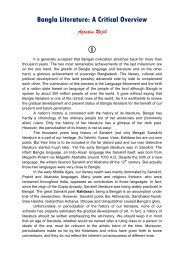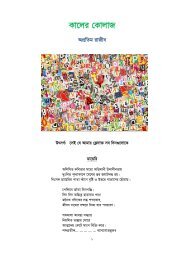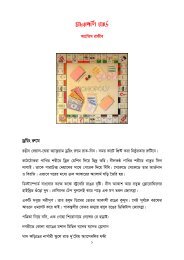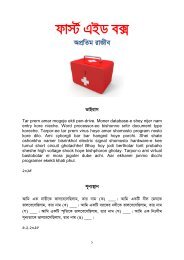BLiterature-Apratim
Create successful ePaper yourself
Turn your PDF publications into a flip-book with our unique Google optimized e-Paper software.
44<br />
Jibanananda’s poems possess an innate consciousness about women, which<br />
had a precursor in Sarat’s novels. His poems tell us of the catastrophe of love in the<br />
modern world.<br />
His poems bear the mark of townsmen’s nostalgia for country-life and nature<br />
from what they’ve been alienated.<br />
There is a sham accusation against him; it is that he just copied many of his<br />
poems from English and other Western literatures which, I sternly say, is an insulting<br />
infamy. I have matched his poems with those of the western poets who are called his<br />
‘preceptors’ and have found that he just assimilated those. Now if assimilation is a<br />
sin in the world of art, then all literary artists including Shakespeare must face<br />
posthumous penalty.<br />
In merit, Jibanananda stands next to Tagore in modern Bangla poetry. His<br />
accidental death did not let him achieve the supremacy in poetry. A critic (Abdul<br />
Mannan Syed) called him ‘the perfect poet’; this honoring of Jibanananda is not<br />
entirely imperfect.<br />
Showkat Osman (1917-’98)<br />
The narrative style that Saratchandra had introduced in fiction, was advanced<br />
by Tarashankar and Manik. Later it found a unique shape in the works from East<br />
Bengal. Showkat Osman used the style of Sarat in portraying Bengali Muslim life of<br />
the Eastern part of the province. His literary achievement (especially the novel<br />
Janani) could be envied by Sarat himself. He took this typical style of fiction to a<br />
different height.<br />
Showkat’s Janani (Mother) is a great achievement not only of Bangla<br />
literature but also of world fiction. Before him, Maxim Gorki, D.H. Lawrence, Manik<br />
Bandyopadhay and Mahasweta Devi wrote on the similar theme. But in Showkat’s<br />
novel, ‘mother’ has been unprecedentedly glorified. The mother portrayed by<br />
Showkat achieves an eternal appeal.<br />
A poor mother named Daria Bibi’s lifelong struggle for her children is<br />
portrayed in this novel. After her first husband’s death, Daria marries for the second<br />
time thinking of her son’s future. However, she is forced to leave him with her inlaws.<br />
She gives birth to three more children by her second husband. Her husband,<br />
who feels disturbed by cruel poverty, now and then leaves his family and goes out of<br />
the village in search of livelihood. She forbears all these manners of her husband.<br />
For her children, she sometimes goes against him.<br />
Meanwhile, Daria’s distant brother-in-law, who is a lustful man, begins to<br />
come to their house now and then. He helps them financially and thus wins their<br />
heart. Daria finds him to have ill motive, but allows him thinking of her economic<br />
helplessness. Her second husband too dies. Thereafter that shrewd person gratifies<br />
her lust for Daria. But thinking of her sons’ survival, she accepts her victimization by<br />
him. But more pathetically, the helpless widow becomes pregnant. She does not try<br />
to abort the child rather she gives its birth with motherly affection. Therefore thinking<br />
of her and her children’s humiliation in the society, she decides to take her own life.


